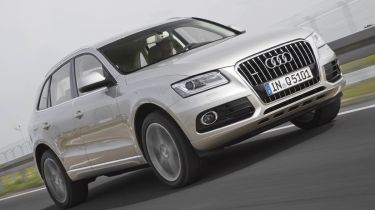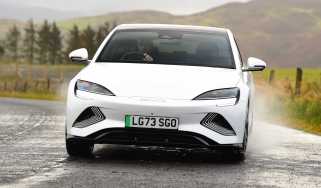Audi Q5 2.0 TDI
The Audi Q5 has received a round of updates, inside and out, and we've driven the best-selling 2.0 TDI model

Although the Q5 has outsold its main rivals since launch, it suddenly has the Evoque to contend with – and that means it’s time for a mid-life revamp. The tweaks inside and out are successful – if surprisingly subtle – and most versions gain performance with enhanced efficiency. The 174bhp TDI is a great all-rounder and works well with the dual-clutch transmission. In fact, it makes the new 309bhp SQ5 seem rather pointless.
The Audi Q5 is facing stiff competition from the hot-selling Range Rover Evoque, so Audi has applied a raft of changes inside and out to boost the car’s appeal. And one of the stars of the range is this 2.0-litre TDI mated with Audi’s excellent dual-clutch automatic gearbox. The newcomer is not only faster than before, but it is considerably more fuel efficient, too.
All new Q5s get modest design changes including a restyled grille, bumpers, bonnet and lights – although you need to pay £2,400 extra for the S line to really notice the difference, as that comes with distinctive xenon and LED lights.
Even so, the base SE driven here features 18-inch alloy wheels. It’s just a shame that versions powered by four-cylinder engines miss out on the new dual-exit exhaust design found on the six-cylinder models.
Used - available now
The interior enhancements are even more subtle, amounting to slight trim updates and the addition of new colours and materials. Supple leather is standard for the seats as part of a generous specification that also features three-zone climate control, auto lights and wipers, rear parking sensors, a decent stereo and Bluetooth.
As you’d expect, the cabin is beautifully put together. There’s plenty of room for five adults, and a usefully shaped 540-litre boot – about average for this type of car. The driver sits up high, which is great for visibility, and there’s plenty of adjustment in the seat and steering wheel.
A wide range of engine options will eventually filter through to the UK, but this model is one of the key launch cars. And despite a modest performance boost (30Nm more torque plus an additional 7bhp), CO2 emissions drop from 184g/km to a far more tax-friendly 159g/km. That helps give it the lowest running costs in its class – just undercutting the BMW X3. It’s also likely to hold its value remarkably well.
The Q5 continues to be an accomplished car on the road. Audi claims it has tweaked the suspension components, but the most noticeable change is to the steering – it’s now an electro-mechanical system as part of the quest for increased efficiency. It offers relatively little feel, but then the Q5 is hardly a sports car.
Instead, the driver learns to rely on the car’s plentiful grip and rock-solid body control. On some surfaces the ride is a tad too firm, but given that the forecasted combined take-up of S line and S line plus models is 77 per cent, that’s not likely to be of concern to the Q5’s core buyers.
The 2.0 TDI engine pulls strongly no matter what the revs, and it works well with the S tronic gearbox, which shifts sharply through its seven ratios. Those searching for a talented off-road machine should look elsewhere, but the four-wheel-drive system will be useful come winter.
This makeover certainly keeps the Q5 fresh and at the top of its game, although given the eye-catching Evoque’s popularity it’s surprising Audi didn’t do more with the styling. Perhaps that’s why the classy S line plus is predicted to be the best-selling trim.











